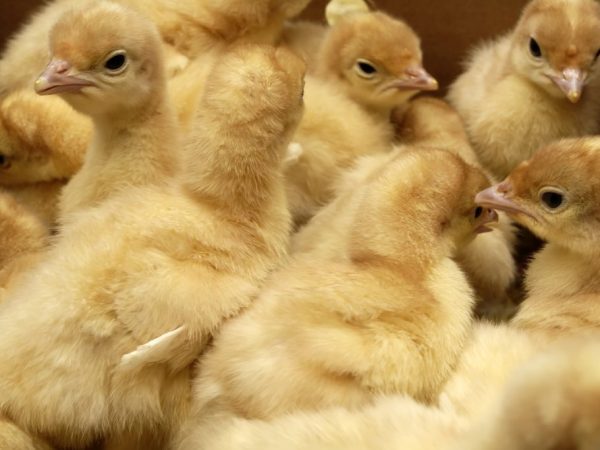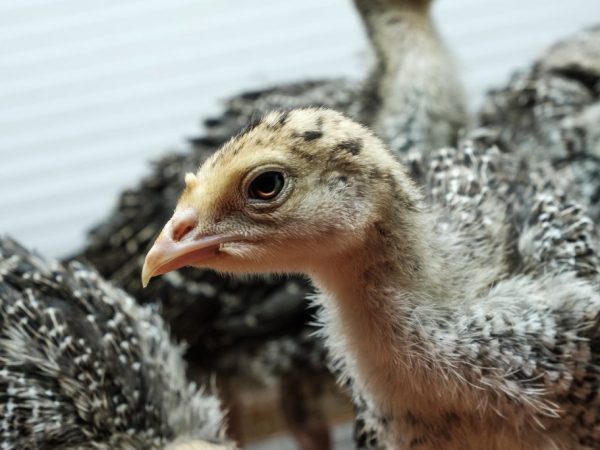Breeding turkey poults in an incubator
Breeding turkey poults in an incubator is a rather difficult stage, but if all the requirements are met, even a novice farmer can cope with this task. Turkey has already become a traditional dish on our table, and not only on holidays. Many people eat turkey every day - it's delicious, nutritious and healthy. As is already well known, America is considered the birthplace of such a bird. This is also related to the peculiarities of her breeding in our country.

Breeding turkey poults in an incubator
The bird is very demanding in care, it needs a certain temperature, humidity, nutrition and care. Breeding turkeys is now very popular, both industrially and at home breeding levels.
There are several conclusions of turkeys at home... The first, and very simple, practically cost-free, is natural breeding. The disadvantage of such breeding is the number of offspring, and the quality sometimes suffers. This is due to the fact that our natural conditions are a comfort zone for birds, not an optimum. The second, and more reliable way is to breed turkeys at home in an incubator. This method guarantees the success and quality of the reared offspring.
How to choose the right breed of turkeys for hatching in an incubator?
There are a lot of turkey breeds, there is even a special table for farmers with all the pros and cons of this or that variety of birds. That is why it is worth very responsibly choosing the breed for withdrawal. In this case, it must be borne in mind that turkeys are bred for good and high-quality meat and for sale. Therefore, turkey meat should not only be of high quality, but also have a presentation.
The main breeds of turkeys are
- North Caucasian bronze breed... This breed is very beneficial for breeding, since the mass of an adult turkey reaches 50 kg. Many domestic producers, both industrial and home-made, choose this particular breed. Also, the pluses of this breed include a large offspring. On average, one turkey of this breed produces 80 eggs per year.
- Bronze broad-breasted breed. It shares many characteristics with the North Caucasian breed. In fact, it differs only slightly in appearance.
- White broad-breasted breed... This breed is considered one of the best. The number of offspring can reach 100-120 eggs in 12 months, or even more. Accordingly, such a turkey will cost more, and its meat is much better.
Types of incubators
Incubators are different.
- Top heating
- Bottom heating
If you want future turkeys to feel like they are in the wild, then a top-heated incubator and optimal ventilation will come in handy. Unfortunately, such heating has its drawbacks. These include the fact that warm air tends to rise upward. This is why if you choose to hatch your poults at home in an incubator, your birds may receive less precious heat.In this aspect, it would be better to take an incubator with underfloor heating.
This will save you some money. Unfortunately, both options one and the other have one common drawback - heating does not go evenly, which means it will not be as effective as we would like. In any case, instructions are attached to each equipment. Homemade output devices and the manufacture of such a device as a thermostat and a humidifier are possible, but they require certain knowledge and skills from the breeder.
Not all people can make drawings on their own so that in the future automation will turn out, it is best in this case to purchase a ready-made regulator. Of course, the people's kulibins have already come up with ways to correct such shortcomings. The chamber can be lined with special foil to save heat from turkey eggs. Just remember to make ventilation holes so the eggs don't suffocate.
The advantages of growing in an incubator include
- The ability to raise chicks without a mother.
- You are in control of the entire process.
- A large number of chicks at a time.
Making an incubator at home
Many farmers, in order to get good offspring, try to make a device or tray in order to incubate the turkey. The price of an incubator may differ depending on what materials will be used and how you will make a special tray. In order for incubation and hatching to go well, you need to make a structure with your own hands, so that it is with automatic egg turning.
If there is no automatic turnover, but at some stages of rearing, it is necessary to turn the eggs several times a day and even at night. There is a special ne555 circuit or a 555 microcircuit called an interval timer, it is this device that makes the incubator completely autonomous. The scheme for building an incubator should be the simplest, no even the coolest incubator will cope with its task if it does not have a heat and air supply controller, such as a refrigerator or microwave.
Such a structure can be made of foam or a cardboard box, it must have a lattice in it. Any machine, even the smallest one, must be sized optimally for turkey eggs and chickens. In order not to be mistaken with the dimensions, before proceeding with the collection of a home incubator, it is worth studying all kinds of educational videos and photos of the construction of this equipment.
Which eggs are suitable for growing at home?

Healthy turkey poults don't come from every egg
Unfortunately, not all turkey eggs are suitable for an incubator. If you want a positive result, then the choice of eggs should be treated very carefully.
Criteria for the correct selection of eggs
- Egg shape. It should be strictly correct, slightly oval.
- The shell must be clean and beautiful.
- The surface of the egg is perfectly flat, smooth and whole.
- The egg should not have any extra dots that are not typical for a turkey.
Also, before putting eggs in the incubator, they need to be enlightened.
When enlightening, eggs should have the following characteristics
- In any egg, the main thing is the yolk. It must be exactly in the center, otherwise there will be no sense from this egg.
- The contours of the yolk should be indistinct, indistinct.
- The air chamber should be at the blunt end of the egg.
If you adhere to all these criteria, then your hatching eggs will successfully hatch and good meaty turkeys will grow from them and you will not think about where to put your spoiled eggs. In order to be even more confident in the result, it is best to take eggs from turkeys, over eight months. But the most suitable season would be spring and autumn. It is during this period that birds give the most offspring. Make sure you have a spreadsheet where you will record hatching of turkeys in the incubator by day and week.
Eggs also have a certain shelf life.Such eggs can be stored for a maximum of 10 days. After that, they are no longer suitable for an incubator.
You cannot wash the eggs, as you will violate the natural protection of the egg and the turkey will simply die. As mentioned earlier, turkeys are very demanding on living conditions. Eggs are the same. For example, storage humidity should be no more than 84%. The storage temperature is significantly lower than for an adult turkey. Eggs tolerate temperatures up to 12 degrees. But it will not be enough to comply with all these conditions.
Setting eggs correctly in the incubator
- You need to prepare the incubator itself. Such preparation begins one day before the laying.
- In incubators, humidity control is not yet provided, which is why a vessel with water is placed on the bottom. Then the humidity will reach the required level. Of course, a thermometer is needed to constantly adjust the temperature. Usually, two thermometers are always set, 2 cm higher from the eggs.
- Eggs are also worth noting. For example, 1 and 2 are at opposite ends. This is so that you can turn the eggs every 4 days. A harmless, simple pencil is best suited for this purpose.
- When placing the eggs, make sure that the marks on the top are the same, otherwise you will simply get confused.
- It is recommended to turn the eggs every three to four days.
- On the 25th day, such manipulations should be stopped, because your turkeys will soon be born.
- Eggs should be placed with a strictly blunt end towards the bottom.
Egg life in an incubator
Usually, under optimal conditions, it takes 28 days from laying to the birth of the first turkeys. All these 28 days they are taken care of, the temperature and humidity are maintained. The temperature should be different on all these days.
- From 1-8 days the temperature should be 37.8 degrees on the thermometer No. 1 and 30 on the thermometer No. 2.
- From 9-21 days the temperature drops slightly, to 37.6 degrees.
- From 22-25 days, the temperature is kept at 37 degrees.
- And from the 26th day - turkey poults are already slowly beginning to hatch. At this time, the temperature should be 37.4 degrees on the thermometer No. 1 and 29 on the thermometer No. 2.
While the chicks are already beginning to hatch, the temperature is reduced to 36 and the air supply increases, since already hatched chicks need a lot of oxygen. If you want good and healthy offspring, then the eggs need to be turned up to 4 times a day. If everything goes well, then after two weeks a respiratory organ is formed in the bird, and it is he who helps the chick to breathe all this time.
When the chick is just starting to hatch, it can be seen with the naked eye. But this is not a quick process, so be patient. During normal development, the egg should be dark and the contours are constantly changing. If it doesn't, your chick is most likely dead. After these actions, the turns are already stopped. During this period, there should be a lot of oxygen and heat in the incubator.
Useful Tips
Especially in the first weeks of life at home, you should take care of the chicks. Of such turkey poults are recommended to be fed boiled eggs, cottage cheese, corn grits and millet. This diet will give them the strength to grow and develop. Be very careful, as the device has a heating element, and the incubator is powered by electricity, which can be turned off and then all the chicks will die. Therefore, it is best to also have a generator.
It is worth remembering that turkeys hatch around 10 hours. Therefore, you should be patient, because the process will be long. If you follow all the recommendations exactly and adhere to all the rules at home, then your chicks will be healthy and good meaty turkeys will grow from them.


